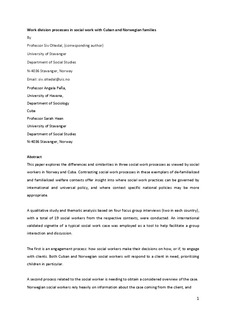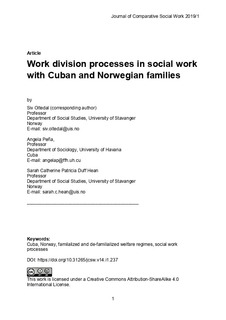| dc.contributor.author | Oltedal, Siv | |
| dc.contributor.author | Pena, Angela | |
| dc.contributor.author | Hean, Sarah | |
| dc.date.accessioned | 2019-08-13T06:56:26Z | |
| dc.date.available | 2019-08-13T06:56:26Z | |
| dc.date.created | 2019-05-13T16:40:54Z | |
| dc.date.issued | 2019-05 | |
| dc.identifier.citation | Oltedal, S., Peña, A., Hean, S. (2019) Work division processes in social work with Cuban and Norwegian families. Journal of Comparative Social Work. 14(1), pp. 165-190. | nb_NO |
| dc.identifier.issn | 0809-9936 | |
| dc.identifier.uri | http://hdl.handle.net/11250/2608002 | |
| dc.description.abstract | This paper explores the differences and similarities in three social work processes as viewed by social workers in Norway and Cuba. Contrasting social work processes in these exemplars of de-familialized and familialized welfare contexts offer insight into where social work practices can be governed by international and universal policy, and where context specific national policies may be more appropriate.
A qualitative study and thematic analysis based on four focus group interviews (two in each country), with a total of 19 social workers from the respective contexts, were conducted. An international validated vignette of a typical social work case was employed as a tool to help facilitate a group interaction and discussion.
The first is an engagement process: how social workers make their decisions on how, or if, to engage with clients. Both Cuban and Norwegian social workers will respond to a client in need, prioritizing children in particular.
A second process related to the social worker is needing to obtain a considered overview of the case. Norwegian social workers rely heavily on information about the case coming from the client, and formal rules restrict information flows between services. In Cuba, clients are important and the participation of the family is obligatory, with social workers drawing on a wide group of stakeholders to gather information.
The final process is one of distributing responsibility for care and support among the appropriate services and actors. In Cuba, social workers emphasize the family`s role in resolving the case. There is a cultural element here based on the role of the family, but a lack of state services and resources available for social workers in practice is also relevant. In Norway, the Welfare State presents more resources, although social workers refer instead to difficulties in coordination between services. Professionals are held to account in Cuba, whereas institutions take responsibility in Norway. | nb_NO |
| dc.language.iso | eng | nb_NO |
| dc.publisher | University of Stavanger, Norway | nb_NO |
| dc.rights | Navngivelse-DelPåSammeVilkår 4.0 Internasjonal | * |
| dc.rights.uri | http://creativecommons.org/licenses/by-sa/4.0/deed.no | * |
| dc.subject | sosialt arbeid | nb_NO |
| dc.subject | Cuba | nb_NO |
| dc.subject | Norge | nb_NO |
| dc.subject | velferdsregimer | nb_NO |
| dc.title | Work division processes in social work with Cuban and Norwegian families | nb_NO |
| dc.type | Journal article | nb_NO |
| dc.type | Peer reviewed | nb_NO |
| dc.subject.nsi | VDP::Social science: 200::Social work: 360 | nb_NO |
| dc.source.pagenumber | 165-190 | nb_NO |
| dc.source.volume | 14 | nb_NO |
| dc.source.journal | Journal of Comparative Social Work | nb_NO |
| dc.source.issue | 1 | nb_NO |
| dc.identifier.doi | 10.31265/jcsw.v14.i1.237 | |
| dc.identifier.cristin | 1697555 | |
| cristin.unitcode | 217,7,3,0 | |
| cristin.unitname | Institutt for sosialfag | |
| cristin.ispublished | true | |
| cristin.qualitycode | 1 | |


